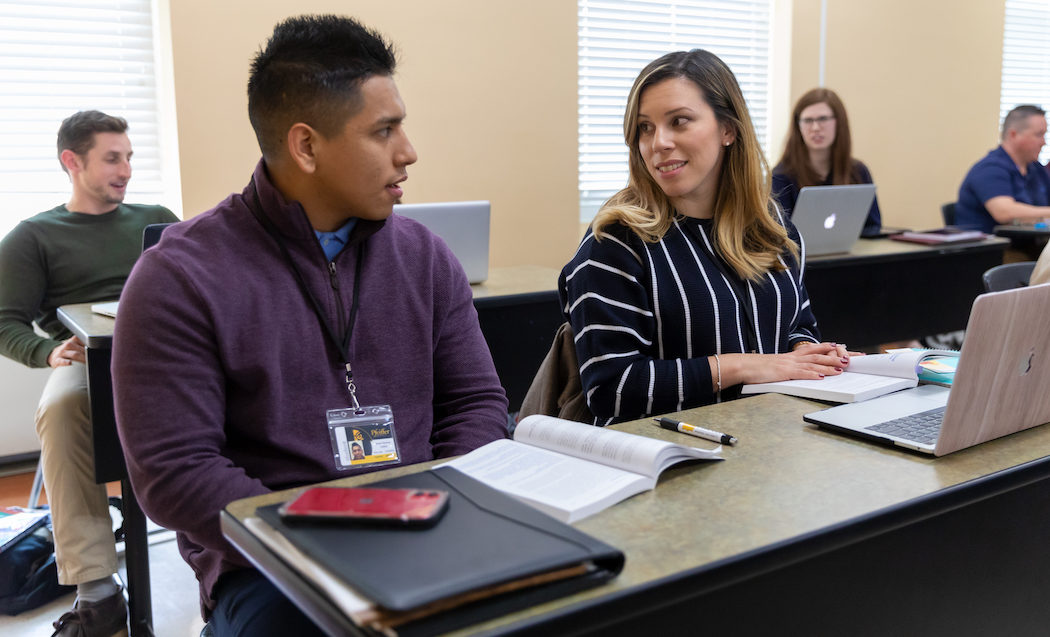- Technical Standards
- Accreditation
- Mission, Vision, and EMBRACE Statement
- NCCPA PANCE Pass Rates
- Program Goals, Competencies, and Learning Outcomes
- Program Description and Curriculum
- Attrition Data
- Admissions
- Campus Location
- MS-PAS Information Sessions
- Technical Standards
- Tuition and Fees
- Faculty and Staff
- Program Policies
- Physician Assistant Studies – MS-PAS
Technical Standards
The Pfeiffer University Master of Science in Physician Assistant Studies (MS-PAS) program is committed to complying with Section 504 of the 1973 Vocational Rehabilitation Act and PL 101-336, the Americans with Disabilities Act (ADA), and also ascertains that the following minimum technical standards must be present in the prospective candidates.
The MS-PAS program has determined technical standards that are essential for successful progression and completion of all aspects of the curriculum, as well as entry into the profession. These technical standards are required for admission and must be maintained throughout the student’s enrollment in the MS-PAS program. In the event a student is unable to fulfill these technical standards, with or without reasonable accommodation, the student will be subject to dismissal.
Candidates must have somatic sensation and the functional use of the senses of vision and hearing. Candidates’ and students’ diagnostic skills will also be lessened without the functional use of the senses of equilibrium, smell, and taste. Additionally, they must have sufficient exteroceptive sense (touch, pain and temperature), sufficient proprioceptive sense (position, pressure, movement, stereognosis, and vibratory) and sufficient motor function to permit them to carry out the activities described in the section above. They must be able to consistently, quickly, and accurately integrate all information received by whatever sense(s) employed, and they must have the intellectual ability to learn, integrate, analyze, and synthesize data.
Technological compensation can be made for some disabilities in these areas, but a candidate should be able to perform them in a reasonably independent manner. The use of a trained intermediary would mean that a student’s judgment must be mediated by someone else’s power of selection and observation. Therefore, third parties cannot be used to assist students in accomplishing curricular requirements in the five skill areas specified below. Reasonable accommodations can be made for documented disabilities.
- Candidates and students must be able to observe a patient accurately at a distance and close at hand.
- Observation necessitates the functional use of the sense of vision, hearing, smell, and somatic sensation.
- Candidates and students must be able to speak, hear and observe patients in order to elicit information, describe changes in mood, activity and posture, and perceive nonverbal communications.
- Candidates and students must be able to communicate effectively and sensitively with patients.
- Candidates and students must be able to communicate (verbal, nonverbal, and written) effectively and efficiently in oral and written form with all members of the healthcare team.
- Candidates and students must possess reading skills at a level to be able to independently accomplish curricular requirements and provide clinical care for patients.
- Candidates and students should have sufficient motor function to elicit information from patients by palpation, auscultation, percussion, and other diagnostic maneuvers.
- Candidates and students should be able to do basic laboratory tests, carry out diagnostic procedures and read EKGs and X-rays.
- Candidates and students should be able to execute motor movements reasonably required to provide general care and emergency treatment to patients.
- Examples of emergency treatment reasonably required of physician assistants are cardiopulmonary resuscitation, the administration of intravenous medication, application of pressure to stop bleeding, the opening of obstructed airways, the suturing of simple wounds and the performance of simple obstetrical maneuvers.
- Such actions require coordination of both gross and fine muscular movements, equilibrium and functional use of the senses of touch and vision.
- Candidates and students must exhibit the following intellectual abilities:
- Measurement
- Calculation
- Reasoning
- Analysis
- Synthesis
- Comprehend three-dimensional and spatial relationships
- Candidates and students must possess the behavioral emotional health required for full use of their intellectual abilities, the exercise of good judgment, the prompt completion of all responsibilities attendant to the diagnosis and care of patients, and the development of mature, sensitive and effective relationships with patients.
- Candidates and students must be able to tolerate physically taxing workloads and to function effectively when under stress.
- Candidates and students must be able to adapt to changing environments, to display flexibility and to learn to function in the face of uncertainties inherent in the clinical problems of many patients.
- Candidates and students must demonstrate empathy, integrity, concern for others, interpersonal skills, interest, motivation, and the ability to interact with people at all levels.
